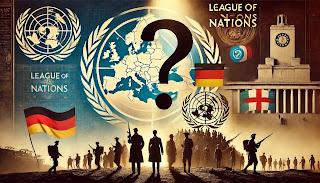Can the Lessons of the Past Illuminate Our Geo-Political Future?
History often casts long shadows, and its echoes offer us critical insights into the currents of our time. A heartfelt letter from a young soldier, as quoted by Eric Hobsbawm in The Age of Extremes, poignantly encapsulates the sacrifice and determination born in the darkest periods of human conflict. His parting words to his mother, written just before his execution, reflect the ideals of a generation fighting for liberation and the hope of a better future. Such intimate moments are set against the backdrop of grand historical movements—World War II’s devastating inevitability, the failures of the League of Nations, and the rise of extremism—all of which continue to resonate today.
The origins of the Second World War cannot be reduced to a single cause or moment. Hobsbawm attributed it to Adolf Hitler, but it was also the result of broader systemic failures. Post-World War I ideals, epitomized by Woodrow Wilson's vision of "peace without victory," sought to create a stable international order through self-determination and collective security. However, these aspirations were undermined by punitive measures in the Treaty of Versailles, which left Germany humiliated, economically crippled, and politically unstable. Wilson’s dream of the League of Nations, designed to prevent future wars, faltered from the start when the United States, a key architect, refused to join, leaving it toothless in enforcing its mandates.
The Aggressors and the Fractured Peace
Germany, Japan, and Italy exploited the weaknesses of this international order. Hitler’s reoccupation of the Rhineland in 1936 was a blatant violation of the Treaty of Versailles, yet it went unchallenged by France or Britain, emboldening further aggression. Mussolini’s invasion of Ethiopia in 1935 defied the League’s principles, but weak sanctions and divided international resolve allowed him to proclaim an "Italian Empire." Similarly, Japan’s occupation of Manchuria in 1931 and its subsequent withdrawal from the League of Nations revealed the fragility of collective security when major powers prioritized national interests over international stability.
Economic Despair and Polarization
The socio-economic conditions of the interwar period were fertile ground for extremism. Germany’s hyperinflation, fueled by reparations and the economic chaos of the Great Depression, created widespread disillusionment. The democratic Weimar Republic was seen as weak and incapable of restoring national pride. In Italy, similar economic struggles and dissatisfaction with the post-World War I territorial settlements gave rise to Mussolini’s fascist movement. Japan, reliant on foreign trade and devastated by the Great Depression, saw its military factions push aggressively for expansion as a means of securing resources and restoring national glory.
The Rise of Totalitarianism
Extremist ideologies flourished in this volatile environment. Hitler’s Nazi Party channeled German grievances into a unifying, albeit destructive, vision of national renewal. His policies of rearmament and Lebensraum (living space) were openly expansionist, setting the stage for a conflict that would engulf the world. Similarly, Mussolini’s fascist regime portrayed itself as a modern iteration of Roman imperialism, using nationalism and militarism to galvanize support. In Japan, the military’s dominance in politics and its emphasis on aggressive expansion reflected a similar disregard for democratic principles.
Lessons and Parallels
Today’s geopolitical landscape bears unsettling parallels to this historical period. Rising nationalism, economic inequality, and the erosion of trust in international institutions challenge the stability of the global order. The polarization that hollowed out the political center in interwar Europe is evident in the ideological divides within modern democracies. Just as the League of Nations struggled to prevent aggression, contemporary institutions like the United Nations face significant challenges in addressing conflicts and enforcing international norms.
The calculated risks taken by aggressor states in the 1930s—testing the limits of international resolve—find echoes in today’s global politics. Whether it is territorial disputes, economic sanctions, or military posturing, the reluctance of major powers to confront violations decisively risks emboldening those who seek to reshape the world order in their favor.
Reflection and Call to Action
History warns us of the consequences of inaction and appeasement. The international community’s failure to address the aggression of the Axis powers in the 1930s paved the way for global catastrophe. As we navigate a world marked by shifting alliances, rising authoritarianism, and pressing global challenges, the question remains: will we learn from the past to forge a stable and just future, or are we destined to repeat the mistakes of history?
In the face of these challenges, one must ask: can modern institutions evolve to prevent the descent into conflict, or will the fractures in our global order deepen, leading us into another era of instability? Will we find the collective resolve to uphold the ideals of peace and cooperation, or will history once again spiral into chaos?



Comments
Post a Comment